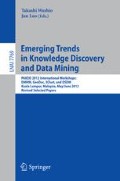Abstract
Ensemble methods are known to increase the performance of learning algorithms, both on supervised and unsupervised learning. Boosting algorithms are quite successful in supervised ensemble methods. These algorithms build incrementally an ensemble of classifiers by focusing on objects previously misclassified while training the current classifier. In this paper we propose an extension to the Evidence Accumulation Clustering method inspired by the Boosting algorithms. While on supervised learning the identification of misclassified objects is a trivial task because the labels for each object are known, on unsupervised learning these are unknown, making it difficult to identify the objects on which the clustering algorithm should focus. The proposed approach uses the information contained in the co-association matrix to identify degrees of confidence of the assignments of each object to its cluster. The degree of confidence is then used to select which objects should be emphasized in the learning process of the clustering algorithm. New consensus partition validity measures, based on the notion of degree of confidence, are also proposed. In order to evaluate the performance of our approaches, experiments on several artificial and real data sets were performed and shown the adaptive clustering ensemble method and the consensus partition validity measure help to improve the quality of data clustering.
Access this chapter
Tax calculation will be finalised at checkout
Purchases are for personal use only
Preview
Unable to display preview. Download preview PDF.
References
Al-Razgan, M., Domeniconi, C., Barbar, D.: Random Subspace Ensembles for Clustering Categorical Data. In: Okun, O., Valentini, G. (eds.) Supervised and Unsupervised Ensemble Methods and their Applications. SCI, vol. 126, pp. 31–48. Springer, Heidelberg (2008)
Domeniconi, C., Al-Razgan, M.: Weighted cluster ensembles: Methods and analysis. ACM Trans. Knowl. Discov. Data 2, 17:1–17:40 (2009)
Duarte, F.J., Fred, A.L.N., Rodrigues, M.F.C., Duarte, J.: Weighted evidence accumulation clustering using subsampling. In: Sixth International Workshop on Pattern Recognition in Information Systems (2006)
Dudoit, S., Fridlyand, J.: Bagging to Improve the Accuracy of a Clustering Procedure. Bioinformatics 19(9), 1090–1099 (2003)
Fern, X.Z., Brodley, C.E.: Random projection for high dimensional data clustering: A cluster ensemble approach, pp. 186–193 (2003)
Fern, X.Z., Brodley, C.E.: Solving cluster ensemble problems by bipartite graph partitioning. In: Proceedings of the Twenty-First International Conference on Machine Learning, ICML 2004, pp. 36–43. ACM, New York (2004)
Fred, A., Jain, A.: Combining multiple clustering using evidence accumulation. IEEE Trans. Pattern Analysis and Machine Intelligence 27(6), 835–850 (2005)
Fred, A., Jain, A.K.: Evidence Accumulation Clustering Based on the K-Means Algorithm. In: Caelli, T.M., Amin, A., Duin, R.P.W., Kamel, M.S., de Ridder, D. (eds.) SPR 2002 and SSPR 2002. LNCS, vol. 2396, pp. 442–451. Springer, Heidelberg (2002)
Fred, A.: Finding Consistent Clusters in Data Partitions. In: Kittler, J., Roli, F. (eds.) MCS 2001. LNCS, vol. 2096, pp. 309–318. Springer, Heidelberg (2001)
Freund, Y., Schapire, R.E.: A Decision-theoretic Generalization of Online Learning and An Application to Boosting. In: Vitányi, P.M.B. (ed.) EuroCOLT 1995. LNCS, vol. 904, pp. 23–37. Springer, Heidelberg (1995)
Hadjitodorov, S.T., Kuncheva, L.I., Todorova, L.P.: Moderate diversity for better cluster ensembles. Inf. Fusion 7(3), 264–275 (2006)
Jouve, P., Nicoloyannis, N.: A new method for combining partitions, applications for distributed clustering. In: International Workshop on Paralell and Distributed Machine Learning and Data Mining (ECML/PKDD 2003), pp. 35–46 (2003)
MacQueen, J.B.: Some methods for classification and analysis of multivariate observations. In: Cam, L.M.L., Neyman, J. (eds.) Proc. of the Fifth Berkeley Symposium on Mathematical Statistics and Probability, vol. 1, pp. 281–297. University of California Press (1967)
Minaei-Bidgoli, B., Topchy, A., Punch, W.F.: Ensembles of partitions via data resampling. In: Proceedings of the International Conference on Information Technology: Coding and Computing (ITCC 2004), vol. 2, pp. 188–192. IEEE Computer Society, Washington, DC (2004)
Saffari, A., Bischof, H.: Boosting for Model-Based Data Clustering. In: Rigoll, G. (ed.) DAGM 2008. LNCS, vol. 5096, pp. 51–60. Springer, Heidelberg (2008)
Sneath, P.H., Sokal, R.: Numerical Taxonomy: The Principles and Practice of Numerical Classification (1973)
Sokal, R.R., Michener, C.D.: A statistical method for evaluating systematic relationships. University of Kansas Scientific Bulletin 28, 1409–1438 (1958)
Strehl, A., Ghosh, J.: Cluster ensembles — a knowledge reuse framework for combining multiple partitions. J. Mach. Learn. Res. 3, 583–617 (2003)
Topchy, A., Jain, A.K., Punch, W.: Combining multiple weak clusterings, pp. 331–338 (2003)
Topchy, A., Minaei-Bidgoli, B., Jain, A.K., Punch, W.F.: Adaptive clustering ensembles. In: ICPR 2004: Proceedings of the Pattern Recognition, 17th International Conference on (ICPR 2004), vol. 1, pp. 272–275. IEEE Computer Society, Washington, DC (2004)
Vega-Pons, S., Ruiz-Shulcloper, J.: A survey of clustering ensemble algorithms. International Journal of Pattern Recognition and Artificial Intelligence 25(03), 337–372 (2011)
Dimitriadou, E., Weingessel, A., Hornik, K.: Voting-Merging: An Ensemble Method for Clustering. In: Dorffner, G., Bischof, H., Hornik, K. (eds.) ICANN 2001. LNCS, vol. 2130, pp. 217–224. Springer, Heidelberg (2001)
Zhai, S.L., Luo, B., Guo, Y.T.: Fuzzy clustering ensemble based on dual boosting. In: Proceedings of the Fourth International Conference on Fuzzy Systems and Knowledge Discovery, FSKD 2007, vol. 02, pp. 240–244. IEEE Computer Society, Washington, DC (2007)
Author information
Authors and Affiliations
Editor information
Editors and Affiliations
Rights and permissions
Copyright information
© 2013 Springer-Verlag Berlin Heidelberg
About this paper
Cite this paper
Duarte, J.M.M., Fred, A.L.N., Duarte, F.J.F. (2013). Adaptive Evidence Accumulation Clustering Using the Confidence of the Objects’ Assignments. In: Washio, T., Luo, J. (eds) Emerging Trends in Knowledge Discovery and Data Mining. PAKDD 2012. Lecture Notes in Computer Science(), vol 7769. Springer, Berlin, Heidelberg. https://doi.org/10.1007/978-3-642-36778-6_7
Download citation
DOI: https://doi.org/10.1007/978-3-642-36778-6_7
Publisher Name: Springer, Berlin, Heidelberg
Print ISBN: 978-3-642-36777-9
Online ISBN: 978-3-642-36778-6
eBook Packages: Computer ScienceComputer Science (R0)

